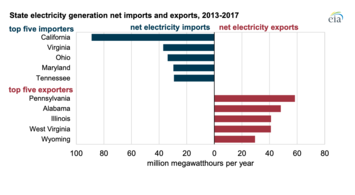
Since intermittent electricity from wind and solar cannot provide continuous uninterruptable electricity, the state continues to rely on the Southwest and Northwest states for its power, and continues to be proud of “leaking” emissions to other states electrical generation so California can claim in-state emission reductions to meet its insatiable electricity demands.
California is proud of being the only state in America that imports more electricity than any other state, now at 32 percent, and by having no plans for new in-state electrical generation to replace the capacity lost from three recent and five forthcoming shuttering of power plants, it will need to increase its imports of high-priced electricity from the Northwest and Southwest to fill the void and let residents and businesses pay the premium.
This great plan is based on the hopes that other states will have that extra capacity to add to the grid! The “hope” is that the Northwest and Southwest will be able to generate enough high-priced electricity out of state for California to meet the electricity demands of the state.
While California crusades toward 100 percent renewables by 2045, it continues to be unable to generate enough of its own electricity in-state, elected leaders and special interest groups blatantly ignore the California climate policy that is supposed to account for and avoid GHG emission displacement, or “leakage” to other states.
In recent years, as the rest of the country, and other world powers, are rushing to build natural gas power plants, California continues to downsize its natural gas fleet. At the same time, the states “green” religion remains adamantly against coal, natural gas, nuclear, and hydro power plants.
2018 appears to have been a big year for natural gas power plant retirements in California. California saw three big plant retirements. Natural gas power plant retirements in 2018:
- Encina at 854 MW
- Mandalay at 560 MW
- Etiwanda at 640 MW
The Redondo Beach natural gas power plant has been an important source of clean and reliable electricity, generating 1,310 MW, which is enough power to light more than one million California homes and businesses. Redondo is just another gas plant shutdown in 2023.
- Redondo Beach at 1,310 MW
Another four upcoming shuttering of continuous and uninterruptable generated electricity are three gas plants and the last nuclear plant in California:
- PG&E’s Nuclear 2,160 megawatt Generating Plant at Diablo Canyon is to be shuttered in 2024.
- The 823 mw Natural Gas Power Plant at Scattergood in Playa Del Rey, to be shuttered in 2024.
- The 575 mw Natural Gas Power Plant at Haynes in Long Beach, to be shuttered in 2029.
- The 472 mw Natural Gas Power Plant at Wilmington, to be shuttered in 2029.
Natural gas accounted for 31% of the Los Angeles’s power supply in 2017, with much of that generation coming from Scattergood, Haynes and Harbor.
In preparation for that next heat wave to hit California’s growing population, the California dysfunctional energy policies have seen three natural gas power plants close in 2018, and four more to be shuttered, along with the last nuclear power plant at Diablo that have been providing continuous uninterruptable electricity to the grid.
California’s prioritization of climate change policies has led to the most expensive electricity and fuels in the country and laid bare the realities of systemic racial, health, economic, and environmental injustices that persist against the social and economic impacts of those that can least afford expensive energy.
If the state wants to do a better job at providing continuous uninterruptable power to its residents, they need to build power plants “in” California, which means natural gas, nuclear, or hydro, all of which are the exact power plants that California wants to be rid of. Can you see the conundrum the state is in? That is why I constantly refer to the electricity policies in California as being dysfunctional!
This piece first appeared on Fox & Hounds Daily.
Ronald Stein is an engineer who, drawing upon 25 years of project management and business development experience, launched PTS Advance in 1995. He is an author, engineer, and energy expert who writes frequently on issues of energy and economics.
Image credit: U.S. Energy Information Administration (EIA), from 4/04/2019 archive












